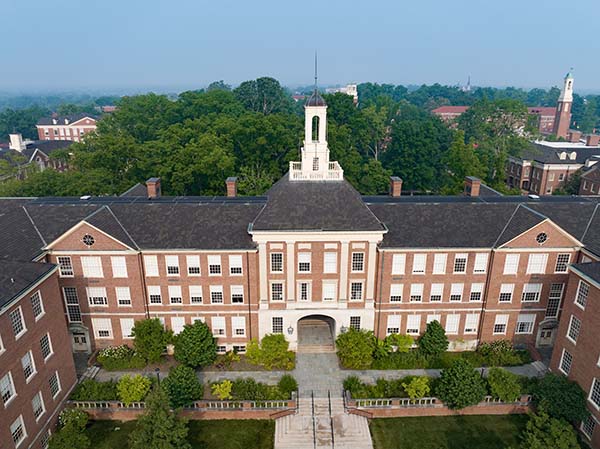External funding at Miami University sets another record in fiscal year 2023
“Our portfolio of awards is a glimpse of the outstanding work at Miami in both research and public service,” Rick Page said

External funding at Miami University sets another record in fiscal year 2023
Miami University set a new record for extramural funding for fiscal year 2023, continuing a trend established over the past six years.
Total external funding received for grants and contracts from July 1, 2022-June 30, 2023 was $37 million, an increase of more than 5% over FY 2022 — which was also a record year for funding, Miami’s Office of Research and Innovation reports.
“It is remarkable how the efforts of our talented faculty and staff are recognized by $124 million in active awards,” Rick Page, associate vice president for Research and Innovation, said. This includes $42 million for basic research, $29 million for applied research, and $32 million for public service.
“The category of ‘basic research,’ though commonly used, does not do these efforts justice. Nothing about it is easy or basic,” Page said. “It truly is fundamental discovery research in which our students, faculty, and staff are challenging paradigms and making discoveries that will serve as the foundation for future research and even entirely new fields.”
Miami staff brought in more than half of FY 2023 grants and contracts
More than 57% of FY 2023 grants and contracts were received by Miami staff, who brought in more than $21.2 million for Miami’s centers and other areas. Some of the top-funded centers include:
- Discovery Center for Evaluation, Research, and Professional Learning
- Myaamia Center
- Scripps Gerontology Center
- School-Based Center of Excellence for Prevention and Early Intervention
Led by Cricket Meehan, the new School Based Center of Excellence (SBCoE) for prevention and Early Intervention received $5 million in FY 2023 to address ongoing mental health crisis in Ohio K-12 schools. The funding was awarded through a partnership between Ohio Department of Mental Health and Addiction Services (OhioMHAS) and the Ohio Department of Education to prioritize mental health and wellness for K-12 students and staff across the state.
Led by Randi Thomas ’88 MA ’90, Miami's office of ASPIRE cultivates partnerships with corporate, community, and government entities, and has contributed to the success of external funding for some of these centers and has been responsible for major external awards supporting the opening this year of the Fisher Innovation College@Elm. The technology, entrepreneurship, and workforce development hub transforms a three-block area in Oxford’s business district into a high-tech innovation and creativity corridor. It includes an entrepreneurial training center in partnership with Miami and the Butler County Small Business Development Center. Tenants will include the Fischer Group, 1809 Capital, and the city of Oxford, among others.
Strategic priorities: Capitalize on new funding opportunities
Strategic priorities for the office of research and innovation include capitalizing on new funding opportunities related to the CHIPS and Science Act of 2022 and partnering with other institutions in the region.
According to Page, the CHIPS and Science Act of 2022 represents a fundamental shift in prioritization of research funding in the United States, and recognizes the contributions and potential of universities such as Miami.
With a designation of an “Emerging Research Institution,” Miami is a member of the group of institutions which educate the majority (57%) of undergraduate students, yet receive less than 10% of federal dollars for research and development.
“The efforts of Emerging Research Institutions have far-reaching impacts across our society, and provisions within the CHIPS and Science Act provide opportunities for increased federal investments that can further advance the mission and impact of Miami and other Emerging Research Institutions,” Page said.
Miami is also capitalizing on other new funding opportunities and partnering with other institutions in our region. Some examples include:
- The Midwest Semiconductor Network (MSN): a group of 70 companies and institutions of higher education all working to advance the goal of bringing more advanced semiconductor manufacturing to the Midwest and connecting this growing industry with a base of highly skilled graduates.
- The universities of the Mid-American Conference (MAC) are competitors on the field and collaborators across campuses. The Collaborative Research Initiative is capitalizing on the combined strengths of MAC institutions to pursue large research efforts that would not be possible at any single institution of higher education.
- In early 2023, Miami joined forces with entities across Ohio and the region to form the Midwest Microelectronics Consortium (MMEC). These efforts contributed to submission of a proposal through Battelle and the awarding by the U.S. Department of Defense of funding through the Microelectronics Commons Grant program, part of the CHIPS and Science Act. The Ohio-led consortium will receive $24.3 million in FY 2023 as one of only eight Regional Hubs to support microelectronic manufacturing throughout the Midwest. As a member, Miami will be eligible to submit applications for funding through MMEC. Opportunities for collaboration are also likely throughout the consortium, said Sue McDowell, vice president for Research and Innovation.